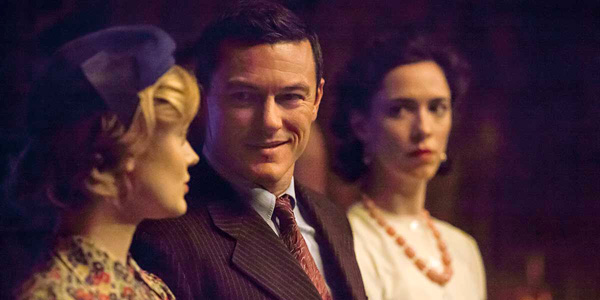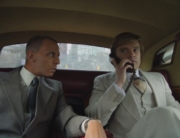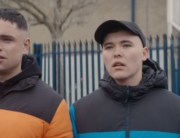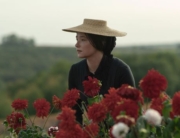
From left, Bella Heathcote, Luke Evans, and Rebecca Hall in Professor Marston and the Wonder Women (Annapurna Pictures)
The three-person dynamic involving Wonder Woman creator William Marston (Luke Evans); his wife, Elizabeth (Rebecca Hall); and their assistant-turned-mutual lover, Olive Byrne (Bella Heathcote), propels Angela Robinson’s biopic, which doubles as a most unusual love story. The birth of a comic-book icon happens along the way, but the end goal is a complex yet ultimately positive portrayal of a polyamorous relationship. Robinson, who also wrote the screenplay, seizes on research that her real-life protagonists were all romantically involved with one another, but what makes the triangle work is that William and Elizabeth are at emotional extremes, while Olive meets them each somewhere in between.
The tension between all three is palpable from the beginning. The year is 1928 as the couple, who both work for the psychology department at Radcliffe, spy Olive competing with a fellow female student for the affections of a young male. This inspires a debate between husband and wife over whether beauty is truly a blessing or a curse, with Elizabeth arguing for the latter. Soon after, when Olive applies to be their assistant, the empathic William asks his wife whether his clear infatuation with the student will be an issue. Elizabeth, cool and aloof, says, of course not, but at the first moment that the two women are alone together, she acts aggressively towards Olive.
All three have a sit-down to hash things out, at which point the younger woman reveals a depth of intellectual curiosity. Soon the three are near-inseparable, which leads to some frankly hilarious antics, such as William and Elizabeth spying on a hazing ritual at Olive’s sorority house, ostensibly to study the dynamics of dominance and submission. At a certain point, Olive is called upon to take a pledge across her knee and spank her on the backside with a wooden paddle. Her expression as she metes out this punishment sparks varied reactions in all three: from arousal in William to disgust in Elizabeth to some combination of the two in Olive.
Their professional collaboration proves fruitful, leading to the invention of the polygraph, which unfortunately William does not think to patent. The trio also forges a bond of intimacy that becomes physical. Robinson, who recently screened the film at NewFest in New York City, mentioned that one of her goals was to explore sexuality from a feminine perspective. While the film features love scenes involving all three characters together, the focus is on Olive and Elizabeth as they explore what they find pleasing, as opposed to performing what might be gratifying for William. The camera also emphasizes the actors’ faces, as they seek and offer verbal consent for what’s about to transpire. This is not to say these scenes lack eroticism or imagination, but the sex is framed as a positive, caring act, not disconnected or mechanical.
All three lead actors do terrific work, especially Heathcote and Hall, the former very quickly subverting the archetype of innocent ingénue through Olive’s eagerness for new experiences, leading to an emotional awakening practically traceable through Heathcote’s eyes. Hall plays Elizabeth as highly confident and intellectual but whose exterior hides fear and self-doubt. Though obviously more emotionally-balanced than the title character the actress played in last year’s Christine, Elizabeth is also a woman who may be too smart for her own good. In this case, the character knows all too well how harshly society reacts to those who choose not to abide by its norms.
Interestingly, the film takes place during a time in which terms such as “polyamory” and “bisexuality” were practically non-existent, and Robinson shows no interest in weighing her script down with psychoanalytic verbiage. Instead, she relies on her actors’ facial features—especially the women’s eyes—and their body language to express what cannot be put into words. This dovetails nicely with the use of the polygraph as an interrogation tool, and even the development of Wonder Woman comics, which William eventually writes under the pseudonym of Charles Moulton. In each of these examples, there is both a public face and a hidden one, with the former always serving as the disguise for the latter, though it cannot hide its true intentions forever.
Eventually, the film starts drawing parallels between its protagonists’ relationship and the nature of Wonder Woman, and that’s where it begins to feel padded, although it is intriguing that Marston was using the superhero to subconsciously influence young boys to submit to strong women. These scenes come at the expense of the unorthodox household, eventually made more complicated by children—both Olive’s and Elizabeth’s, fathered by William—and seemingly worthy of deeper exploration. Robinson also utilizes a flashback structure that puts Wonder Woman front and center from the beginning, rather than letting her grow organically out of the threesome’s shared history.
The result is still a powerful film, but its lens could have been fixed even more firmly on the title figures, who pursued happiness on their own terms.






Leave A Comment